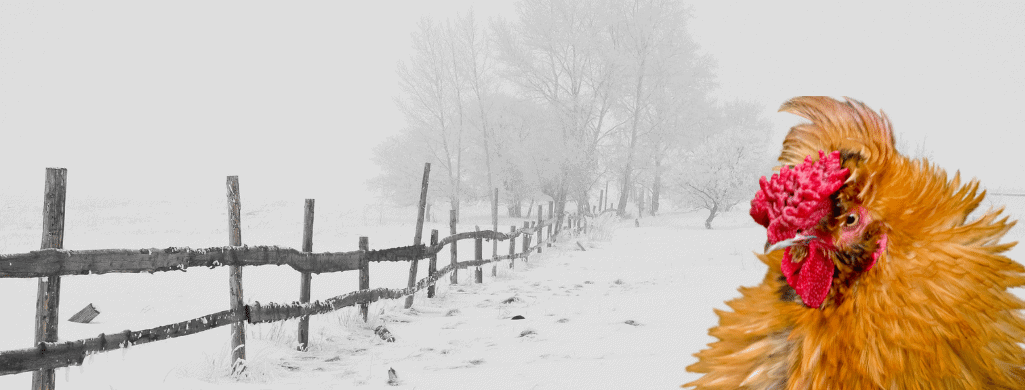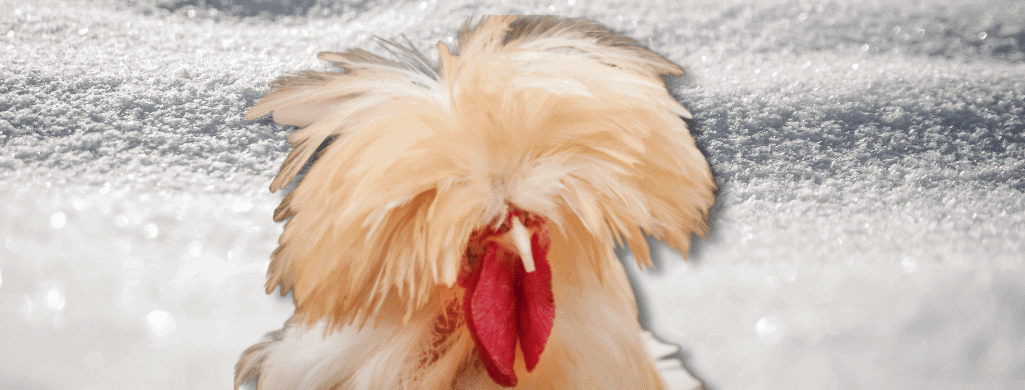Frizzles have a different type of plumage than other chickens.
The feathers on a Frizzle twist and curl away from the body instead of lying flat.
These curly feathers make the Frizzle an unusual-looking bird.
But are Frizzle chickens cold tolerant?
Despite their dense feathering, Frizzle chickens are not tolerant of cold temperatures. Frizzles are unable to maintain a steady body temperature. A Frizzle’s fluffy feathers do not trap warm air because they point away from the body.
Keep reading to learn how to keep your Frizzles warm in cold weather.

Table of Contents
ToggleWhat Kind of Chicken Is a Frizzle?
Frizzle chickens are not a distinct breed type.
Several chicken breeds carry the frizzle gene.
Frizzles are usually found in the following chicken breeds:
- Polish
- Plymouth Rock
- Cochin
- Orpington
- Japanese bantam
- Silkie (known as a “Sizzle”)
The curled feather gene is more prominent in bantam-sized chickens
A dominant gene causes frizzling, so a chicken only needs one copy to pass down the trait.
Chickens with two frizzle genes are known as Frazzles.
It is not wise to breed two chickens with curly feather genes.
Frazzles usually have poor feather quality and are prone to enlarged hearts.
Improper breeding practices cause Frazzle chicks to be bald and have various physical issues.
How Do You Know If Your Frizzle Is Cold?
By looking at them, it is easy to tell if your Frizzle is cold.
Cold birds ruffle up their feathers and perch above the ground.
Most of the time, chickens tuck one of their legs under the body. This one-legged perch keeps the chicken’s feet and toes from freezing.
You may also notice a paler comb and wattle on your Frizzle.
There is no need to worry as long as your Frizzles are not staying hunkered down all day.
A Frizzle suffering from hypothermia has more serious symptoms. Frizzles with hypothermia are stiff and cold to the touch.
The chicken may have its eyes closed or will not blink.
These are severe symptoms, and you must help your chicken immediately.
Take your Frizzle indoors and wrap it in a warm towel.
Once the chicken moves again, place it in a box lined with bedding. Keep the box in a warm spot for a few hours until the chicken recovers.

Is It Safe To Heat a Chicken Coop?
As temperatures gradually fall, your Frizzles become acclimated to the colder temperatures.
Chickens produce enough body heat in a well-insulated coop to keep themselves warm.
Adding a heat source to the chicken coop increases the risk of injury and fire.
Heat lamps catch fire from dust, stray feathers, or getting knocked down.
If the coop is close to your house, you risk setting it on fire as well.
Space heaters are also fire hazards and could cause severe burns to your birds if they get too close.
A sudden drop in temperature causes chickens to go into shock.
Your whole flock could die if you lose electricity or your heat lamp gets unplugged.
Instead of adding extra heat to the chicken coop, aim to keep cold air out.
Keeping the coop warm will help with egg production too!
Further Reading: When do Frizzle chickens start laying eggs?
How Do You Winterize a Chicken Coop and Run?
Winterizing the chicken coop and run is necessary for cold climates.
Your Frizzles need a warm place to get out of inclement weather.
In frigid temperatures at night, chickens need somewhere warm to rest.
The simple steps below outline how to prepare your chicken coop and run for extreme cold.
Clean the Coop
Deep clean the chicken coop in the fall before temperatures drop.
Replace the bedding and clean the nesting boxes.
It is time to turn it if you have a deep litter setup.
Dust the corners of the chicken coop for mites.
The mites may seek a warm place to stay when the weather gets colder.
Mites will not survive freezing temperatures but thrive in the warm coop.
Prevent Drafts
To prevent drafts, you must insulate the coop, but do not make it airtight.
Drafts are dangerous to Frizzles in the winter, but a lack of ventilation causes moisture buildup.
Moisture causes frostbite on the combs and wattles.
Seal cracks where drafts might blow through.
You may add insulation, but it must be covered so the chickens will not eat it.
Loose straw works well as insulation as long as it stays dry.
Wet straw becomes moldy and releases toxic mold spores.
Increase ventilation by placing vents near the top of the chicken coop.
Ensure the vents are above the roost so cold air does not blow directly on your Frizzles.
Do not leave drinking water in the coop, as it increases humidity.
Ideal humidity levels are between 50 and 70%.
Use a hygrometer to monitor humidity levels inside the coop.

Provide Wide Roosting Bars
Wide roosting bars allow your Frizzles to cover their feet with their body feathers.
This will protect the feet and toes from frostbite.
Flat roosting bars prevent foot deformities in your chickens.
Never use curved roosting bars, as they lead to bumblefoot.
Wood is a good material for roosting bars because they retain heat.
Metal roosting bars will get too cold in the winter and possibly cause frostbite.
Cover the Run
It is vital to keep your Frizzles dry in the winter months.
If your frizzles get wet, they are more susceptible to frostbite and hypothermia.
Frizzles with feathering on the legs are at an even higher risk of frostbite to their feet and toes.
Cover the run with clear plastic to allow sunlight in and keep the snow out.
If you live in a cold climate with lots of snowfall, consider building a sturdier roof over the run.
Plastic may not be able to support the weight of heavy snow.
Add some perches and toys to the run to prevent boredom when it is too cold or wet for free-ranging.
Place pea gravel or wood chips on the floor of the chicken run to keep it from getting muddy.
Other Ways to Keep Your Frizzles Warm
There are other ways to ensure your birds stay comfortable all winter.
Apply a layer of vaseline to the comb and wattles to prevent frostbite.
Reapply the vaseline every few days as necessary.
Keeping your Frizzles hydrated helps them maintain a constant body temperature.
Your Frizzles need access to clean water throughout the day.
Using a heated waterer prevents the water from freezing.
Digestion increases the body temperature of chickens.
Feed your Frizzles some chicken scratch close to bedtime.
Chickens eat more during cold temperatures, so keep the feeders full during the day.
Keeping Frizzles Warm: The Final Word
Frizzled feathers appear fluffy, but they are not insulating.
It is up to you to keep your Frizzles warm during the winter.
Learn to recognize the signs of hypothermia so you are able to help your Frizzles.
Provide your chickens with an insulated coop and plenty of fresh water and food.
With special attention, your Frizzles will stay comfortable all winter.
Keep reading about these fuzzy birds and learn if it’s safe to breed two Frizzles together.
How useful was this post?
Click on a star to rate it!
We are sorry that this post was not useful for you!
Let us improve this post!
Tell us how we can improve this post?
